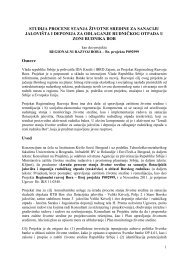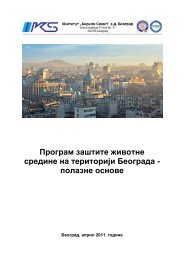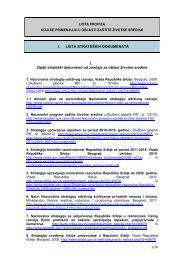transport of dangerous goods and risk management - Kirilo SaviÄ
transport of dangerous goods and risk management - Kirilo SaviÄ
transport of dangerous goods and risk management - Kirilo SaviÄ
Create successful ePaper yourself
Turn your PDF publications into a flip-book with our unique Google optimized e-Paper software.
TRANSPORT OF DANGEROUS GOODS AND RISK MANAGEMENT 153Model <strong>of</strong> global social development contributes to the avoidance <strong>of</strong> emergency situations primarily theenvironmental ones, but also those <strong>of</strong> technogenic character <strong>and</strong> it also contributes to the achievement <strong>of</strong>environmental safety. The sustainable development is at the heart <strong>of</strong> the concept <strong>and</strong> it includes economic,technological, social <strong>and</strong> cultural development harmonized with the requirements <strong>of</strong> the protection <strong>and</strong>improvement <strong>of</strong> the environment. In order to avoid the <strong>risk</strong>, it is necessary to have mutually harmonizeddevelopmental supports: economic, social, cultural <strong>and</strong> the environment. However, it requires a different attitude <strong>of</strong>a man <strong>and</strong> society towards the nature as well as the updated underst<strong>and</strong>ing <strong>of</strong> the role <strong>of</strong> a man in solving globalproblems related to population <strong>and</strong> development, economy, armament race, food, energy, social issues, theenvironment <strong>and</strong> science <strong>and</strong> technology, <strong>and</strong> the solution <strong>of</strong> these problems contributes to global security <strong>of</strong> theplanet. It is also necessary that there exist the consciousness, individual <strong>and</strong> collective, <strong>of</strong> avoiding the <strong>risk</strong>yactivities, but also <strong>of</strong> the appropriate action at the time when the extreme events <strong>and</strong> emergency situations occur,whereas special attention must be directed to research <strong>of</strong> the behaviour <strong>of</strong> the individuals who are pr<strong>of</strong>essionallyinvolved in such situations.Sociology as a general social science must address the research <strong>of</strong> the emergency situation as a social category,exploring the causes <strong>of</strong> action <strong>of</strong> specific social groups, particularly the political elite in emergency situations,which is how it would contribute better <strong>and</strong> more to the achievement <strong>of</strong> security in a society. 1EMERGENCY SITUATIONS MANAGEMENT AS A SPECIAL FORM OF RISKThe <strong>risk</strong>s, as probable or possible events in social, technical <strong>and</strong> ecological spheres can lead to a decline in thequality <strong>of</strong> life <strong>and</strong> are one <strong>of</strong> the most topical problems <strong>of</strong> modern civilization, so that <strong>risk</strong> prediction, minimization<strong>and</strong> <strong>management</strong> become the subject <strong>of</strong> research <strong>of</strong> many sciences. Regardless <strong>of</strong> whether the <strong>risk</strong>s are <strong>of</strong> natural orsocial character, they represent a potential danger <strong>of</strong> violating the balance in the system society-nature, <strong>and</strong> theycondition the appearance <strong>of</strong> unfavourable situation, extreme events or emergency situations. If we take into accountthe causes <strong>of</strong> emergency situations (natural disasters, technical accidents <strong>and</strong> disasters, the application <strong>of</strong> means <strong>of</strong>mass destruction <strong>and</strong> the anthropogenic actions on the nature) but also the consequences (loss <strong>of</strong> lives, violation <strong>of</strong>human health, pollution, degradation or destruction <strong>of</strong> the natural components <strong>of</strong> the environment), the st<strong>and</strong>pointthat the global security is a priority task <strong>and</strong> aim at both global <strong>and</strong> national levels is beyond any doubt.It cannot be disputed that <strong>risk</strong>s today are increasingly taking a global character <strong>and</strong> their scope is constantlyincreasing as well as the number <strong>of</strong> potentially endangered people, material resources <strong>and</strong> territories <strong>of</strong> potentialdisturbance <strong>of</strong> ecological balance. Emergency situations represent a special kind <strong>of</strong> <strong>risk</strong> because <strong>of</strong> their possiblesignificant consequences, which can be divided by their nature to cumulative <strong>and</strong> accidental, anthropogenic <strong>and</strong>natural, <strong>and</strong> so on. Risk <strong>management</strong> is an organized process <strong>of</strong> identifying <strong>and</strong> measuring <strong>risk</strong>, selection,development <strong>and</strong> implementation <strong>of</strong> options for <strong>risk</strong> <strong>management</strong> <strong>and</strong> monitoring. Considering that emergencysituation is a special type <strong>of</strong> <strong>risk</strong>, <strong>risk</strong> <strong>management</strong> includes the <strong>management</strong> <strong>of</strong> emergency situations. 2The process <strong>of</strong> <strong>risk</strong> <strong>management</strong> related to the occurrence <strong>of</strong> extraordinary situations, as a specific manifestation,includes the following stages: <strong>risk</strong> identification, analysis <strong>of</strong> consequences, <strong>risk</strong> assessment, planning <strong>of</strong> measuresfor the prevention <strong>of</strong> emergency or <strong>risk</strong> reduction, organization <strong>of</strong> preparedness measures to respond to the situationarose <strong>and</strong> planning <strong>of</strong> recovery measures. 3 In order to eliminate, control or minimize the causes <strong>of</strong> <strong>risk</strong>s <strong>and</strong>potential effects <strong>of</strong> hazardous events, the <strong>risk</strong> must be managed. Management systems, aimed at planning, control<strong>and</strong> reduction <strong>of</strong> <strong>risk</strong> are the most reliable models <strong>of</strong> <strong>risk</strong> <strong>management</strong>.1 Blagojevic, M., "The role <strong>of</strong> special units <strong>of</strong> the MUP RS in terms <strong>of</strong> peacetime emergencies", MA thesis, Faculty <strong>of</strong> Security,Belgrade 2009., pp. 23-26.2 Ibid.3 More in: Savic, S., Andjelkovic, B., Stankovic, M., Specific <strong>risk</strong> <strong>management</strong> systems <strong>and</strong> emergency situations, Proceedings<strong>of</strong> the Symposium on Operational Research, SYMOPIS-06, Faculty <strong>of</strong> Organizational Sciences, Belgrade 2006.








